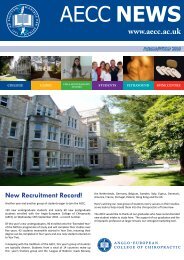Whole report - Anglo-European College of Chiropractic
Whole report - Anglo-European College of Chiropractic
Whole report - Anglo-European College of Chiropractic
You also want an ePaper? Increase the reach of your titles
YUMPU automatically turns print PDFs into web optimized ePapers that Google loves.
Number<br />
Figure 1<br />
50<br />
40<br />
30<br />
20<br />
10<br />
0<br />
Spotlight on Paediatrics<br />
Joyce Miller BS, DC, DACBO, FCC<br />
Senior Clinical Tutor<br />
The Paediatrics Programme at AECC has a new look with the addition <strong>of</strong> a<br />
Master’s degree. Accredited by Portsmouth University and coordinated by<br />
Joyce Miller as well as featuring numerous acclaimed guest lecturers (see<br />
panel), this three-year part-time programme leads Master’s students to gain<br />
expertise in diagnostic and therapeutic skills to create comfort and satisfaction<br />
in treating the enigmatic problems <strong>of</strong> the paediatric patient. Upon successful<br />
completion, the Master’s students will lead the pr<strong>of</strong>ession in qualifications and<br />
expertise to provide optimal care to the smallest members <strong>of</strong> the family.<br />
Chiropractors pride themselves on the ability to fully<br />
understand the anatomy and biomechanics <strong>of</strong> the<br />
spine and extremities <strong>of</strong> the human body in order to<br />
successfully diagnose and manipulate for a healing<br />
outcome. Most undergraduate programmes are<br />
limited in the amount <strong>of</strong> tuition devoted to the special<br />
health issues <strong>of</strong> the paediatric population. It is well<br />
documented that children are not merely small adults<br />
and that specialized study is required to create<br />
expertise in this unique arena.<br />
More and more, parents are turning to conservative<br />
therapies for their children, and the pr<strong>of</strong>ession must<br />
adequately prepare its practitioners to meet the<br />
needs <strong>of</strong> this patient population. Consistent with<br />
parental demand, there is also a growing demand<br />
from health care workers. According to the AECC electronic data collection system, health care workers refer<br />
44% <strong>of</strong> paediatric patients less than two months <strong>of</strong> age. Infants less than six months <strong>of</strong> age represent the<br />
largest group <strong>of</strong> paediatric patients presenting to AECC (See Figure 1).<br />
8<br />
Distribution <strong>of</strong> Patients Under 6 Months <strong>of</strong> Age<br />
(n=347)<br />
47<br />
40 41<br />
30 30 29<br />
15<br />
18 18<br />
10 10<br />
5 1 2<br />
20<br />
2 2 0<br />
10<br />
3 1 1 4<br />
1 2 3 4 5 6 7 8 9 10 11 12 13 14 15 16 17 18 19 20 21 22 23 24<br />
Age (weeks)<br />
Feature Reports<br />
10<br />
Paediatric Postgraduate Faculty<br />
Joyce Miller, Lead Tutor<br />
Bob Phillips, Paediatrician<br />
Steve Williams, Chiropractor<br />
Jan Krier, Extremity Specialist<br />
Sandra Thorkeldsen, Extremity Specialist<br />
Jane Cook, Radiologist<br />
Michelle Wessely, Radiologist<br />
Carol Phillips, Author and Lecturer<br />
Ardrey El Dars, Neurologist<br />
Sally Goddard Blythe, Paediatric Specialist<br />
Tammy Rubinstein, Orthopaedic Chiropractor<br />
Steve Marini, Immunologist, Chiropractor<br />
Fiona Barlow, Social Scientist<br />
Paediatrics at AECC is taught in a<br />
graduated step-wise fashion. At the base<br />
is a 26 hour required undergraduate<br />
course just before the students enter their<br />
clinical training. The course is designed<br />
to teach the student the necessary skills<br />
to enable him/her to conduct a<br />
meaningful history and examination <strong>of</strong><br />
various age groups (between 1 day and<br />
16 years <strong>of</strong> age) and to assess their<br />
growth and development. It is also<br />
expected that upon completion <strong>of</strong> the<br />
course, the student will be familiar with<br />
common congenital and acquired<br />
disorders <strong>of</strong> the paediatric patient (with<br />
emphasis on musculoskeletal and<br />
nervous system disorders) as well as the<br />
social, behavioural and emotional<br />
problems, which are common to<br />
children.



